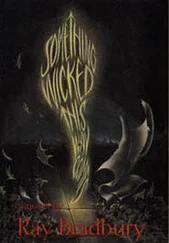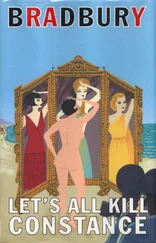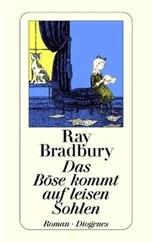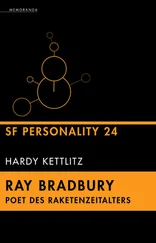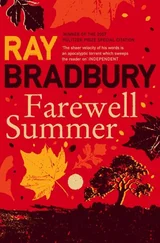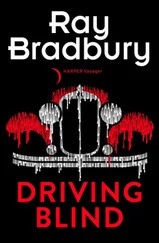“How many years since you had dandelion greens for supper, sir?”
“We won’t go into that!”
Bill kicked one of the grass flats slightly and nodded. “About this grass now. I didn’t finish telling. It grows so close it’s guaranteed to kill off clover and dandelions—”
“Great God in heaven! That means no dandelion wine next year! That means no bees crossing our lot! You’re out of your mind, son! Look here, how much did all this cost you?”
“A dollar a flat. I bought ten flats as a surprise.”
Grandpa reached into his pocket, took out the old deep-mouthed purse, unclasped the silver clasp, and removed from it three five-dollar bills. “Bill, you’ve just made a great profit of five dollars on this transaction. I want you to deliver this load of unromantic grass into the ravine, the garbage dump—anywhere—but I ask you in a civil and humble voice not to plant it in my yard. Your motives are above reproach, but my motives, I feel, because I’m approaching my tenderest years, must be considered first.”
“Yes, sir.” Bill pocketed the bills reluctantly.
“Bill, you just plant this new grass some other year. The day after I die, Bill, you’re free to tear up the whole damn lawn. Think you can wait another five years or so for an old orator to kick off?”
“I know dam well I can wait,” Bill said.
“There’s a thing about the lawn mower I can’t even tell you, but to me it’s the most beautiful sound in the world, the freshest sound of the season, the sound of summer, and I’d miss it fearfully if it wasn’t there, and I’d miss the smell Of cut grass.”
Bill bent to pick up a flat. “Here I go to the ravine.”
“You’re a good, understanding young man, and will make a brilliant and sensitive reporter,” said Grandfather, helping him. “This I predict!”
The morning passed, noon came on, Grandpa retired after lunch, read a little Whittier, and slept well on through the day. When he awoke at three the sun was streaming through the windows, bright and fresh. He lay in bed and was startled to hear the old, the familiar, the memorable sound.
“Why,” he said, “someone’s using the lawn mower! But the lawn was just cut this morning!”
He listened again. And yes, there it was, the endless droning chatter up and down, up and down.
He leaned out the window and gaped. “Why, it’s Bill. Bill Forrester, you there! Has the sun got you? You’re cutting the lawn again!”
Bill looked up, smiled a white smile, and waved. “I know! I think I missed a few spots!”
And while Grandpa lay in bed for the next five minutes, smiling and at ease, Bill Forrester cut the lawn north, then west, then south, and finally, in a great green spraying fountain, toward the east.
On Sunday morning Leo Auffmann moved slowly through his garage, expecting some wood, a curl of wire, a hammer or wrench to leap up crying, “Start here!” But nothing leaped, nothing cried for a beginning.
Should a Happiness Machine, he wondered, be something you can carry in your pocket?
Or, he went on, should it be something that carries you in its pocket?
“One thing I absolutely know,” he said aloud. “It should be bright!”
He set a can of orange paint in the center of the workbench, picked up a dictionary, and wandered into the house.
“Lena?” He glanced at the dictionary. “Are you ‘pleased, contented, joyful, delighted’? Do you feel ‘Lucky, fortunate’? Are things ‘clever and fitting,’ ’successful and suitable’ for you?”
Lena stopped slicing vegetables and closed her eyes. “Read me the list again, please,” she said.
He shut the book.
“What have I done, you got to stop and think an hour before you can tell me. All I ask is a simple yes or no! You’re not contented, delighted, joyful?”
“Cows are contented, babies and old people in second childhood are delighted, God help them,” she said. “As for ‘joyful,’ Lee? Look how I laugh scrubbing out the sink . . .”
He peered closely at her and his face relaxed. “Lena, it’s true. A man doesn’t appreciate. Next month, maybe, we’ll get away.”
“I’m not complaining!” she cried. “I’m not the one comes in with a list saying,’stick out your tongue. Lee, do you ask what makes your heart beat all night? No! Next will you ask, What’s marriage? Who knows, Lee? Don’t ask. A man who thinks like that, how it runs, how things work, falls off the trapeze in the circus, chokes wondering how the muscles work in the throat. Eat, sleep, breathe, Lee, and stop staring at me like I’m something new in the house!”
Lena Auffmann froze. She sniffed the air.
“Oh, my God, look what you done!”
She yanked the oven door open. A great cloud of smoke poured through the kitchen.
“Happiness!” she wailed. “And for the first time in six months we have a fight! Happiness, and for the first time in twenty years it’s not bread, it’s charcoal for supper!”
When the smoke cleared, Leo Auffmann was gone.
The fearful clangor, the collision of man and inspiration, the flinging about of metal, lumber, hammer, nails, T square, screwdriver, continued for many days. On occasion, defeated, Leo Auffmann loitered out through the streets, nervous, apprehensive, jerking his head at the slightest sound of distant laughter, listened to children’s jokes, watching what made them smile. At night he sat on neighbors’ crowded porches, listening to the old folks weigh and balance life, and at each explosion of merriment Leo Auffmann quickened like a general who has seen the forces of darkness routed and whose strategy has been reaffirmed. On his way home he felt triumphant until he was in his garage with the dead tools and the inanimate lumber. Then his bright face fell away in a pale funk, and to cover his sense of failure he banged and crashed the parts of his machine about as if they really did make sense. At last it began to shape itself and at the end of the ten days and nights, trembling with fatigue, self-dedicated, half starved, fumbling and looking as if he had been riven by lightning Leo Auffmann wandered into his house.
The children, who had been screaming horribly at each other, fell silent, as if the Red Death had entered at the chiming of the clock.
“The Happiness Machine,” husked Leo Auffmann, “is ready.”
“Lee Auffmann,” said his wife, “has lost fifteen pounds. He hasn’t talked to his children in two weeks, they are nervous, they fight, listen! His wife is nervous, she’s gained ten pounds, she’ll need new clothes, look! Sure—the machine is ready. But happy? Who can say? Lee, leave off with the clock you’re building. You’ll never find a cuckoo big enough to go in it! Man was not made to tamper with such things. It’s not against God, no, but it sure looks like it’s against Leo Auffmann. Another week of this and we’ll bury him in his machine!”
But Leo Auffmann was too busy noticing that the room was falling swiftly up.
How interesting, he thought, lying on the floor.
Darkness closed in a great wink on him as someone screamed something about that Happiness Machine, three times.
The first thing he noticed the next morning was dozens of birds fluttering around in the air stirring up ripples like colored stones thrown into an incredibly clear stream, gonging the tin roof of the garage softly.
A pack of multibred dogs pawfooted one by one into the yard to peer and whine gently through the garage door; four boys, two girls, and some men hesitated in the driveway and then edged along under the cherry trees.
Leo Auffmann, listening, knew what it was that had reached out and called them all into the yard.
The sound of the Happiness Machine.
It was the sort of sound that might be heard coming from a giant’s kitchen on a summer day. There were all kinds of hummings, low and high, steady and then changing. Incredible foods were being baked there by a host of whirring golden bees as big as teacups. The giantess herself, humming contentedly under her breath, might glide to the door, as vast as all summer, her face a huge peach-colored moon gazing calmly out upon smiling dogs, corn-haired boys and flour-haired old men.
Читать дальше

